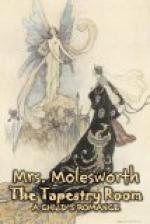“I think it’s very good-natured of Monsieur Dudu to have come with us so far,” he said. “We could never have got into the tapestry castle at all but for him.”
“No,” said Dudu, “that you certainly wouldn’t.” But he didn’t seem offended. “Good-bye,” he said, “and if you’re in any trouble remember the former arrangement. Whistle three times.”
“Good-bye,” said Hugh and Jeanne. But as they said it, their looks met each other in astonishment—there was no Dudu there—he had already disappeared.
“What a queer way he has of going off all of a sudden,” said Jeanne.
“And what are we to do now?” said Hugh.
“Go up the stairs, of course, till we find where they lead to,” said Jeanne.
“It will be rather awkward with our wings,” said Hugh. “The stair is so very narrow and twisting.”
Jeanne made an exclamation.
“Wings!” she said. “Why, Cheri, your wings are gone!”
“And so are yours!” said Hugh.
Both the children stared at each other and turned round to look at their shoulders, as if they could hardly believe it.
“It’s too bad,” said Jeanne. “It’s all Dudu.”
“Never mind,” said Hugh. “He wouldn’t have taken them away if we had been going to need them again; and really, Jeanne, the more I think of it the more sure I am we could never have got up that stair with our wings on.”
“Perhaps not,” said Jeanne. “Any way I couldn’t have got up it with Dudu on my head. But let’s go on, Cheri. Are you frightened? I’m not a bit.”
“I’m not, either,” said Hugh. “Still, it’s a very queer place. I wish Dudu, or Houpet, or some of them, had come with us!”
They set off on their climb up the steep spiral staircase. So narrow it was, that going hand-in-hand was out of the question.
“It’s worse than the staircase down to the frogs’ country,” said Jeanne.
Hugh looked at her triumphantly.
“There now, Jeanne, you do remember,” he said. “I believe it was just pretence your saying you thought I had dreamt it all.”
“No,” said Jeanne, “it wasn’t. You don’t understand, Cheri. I’m moonlight Jeanne, now—when we were having the dolls’ feast I was daylight Jeanne. And you know it’s never moonlight in the day-time.”
“Well, certainly, I don’t understand,” said Hugh. “And one thing particularly—how is it that in the moon-time you remember about the day-time, if in the day you forget all about the other.”
“I don’t exactly forget,” said Jeanne, “but it spoils things to mix them together. And lots of things would be quite spoilt if you took them into the regular daylight. I fancy, too, one can see farther in the moonlight—one can see more ways.”
She was standing at the foot of the stair, a step or two higher than Hugh, and the soft light, which still, in some mysterious way, seemed to come down from above—though, looking up the spiral stair, its top seemed lost in gloom—fell on her pretty little face. Her hair had fallen back over her shoulders and lay dark on her pure white shiny dress; there was a look in her eyes which Hugh had never noticed before, as if she could see a long way off. Hugh looked at her earnestly.




